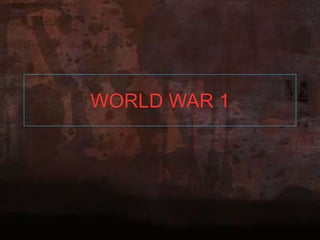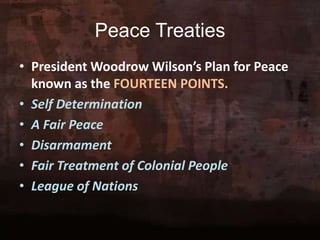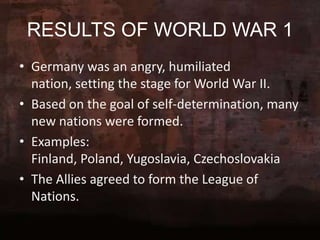World War 1
- 1. WORLD WAR 1
- 3. WORLD WAR 1Great WarOne of the deadliest conflicts in historyWar to end all warsGlobal military conflict that embroiled most of the worldâs great powers
- 4. MAIN CAUSES OF WARMilitarismAlliancesImperialismNationalism
- 5. MILITARISMthe army and military forces are given a high profile by the government.European nations engage in a massive military build up
- 6. AlliancesAn alliance is an agreement made between two or more countries to give each other help if it is needed. European countries form partnerships to protect themselves
- 7. A number of alliances had been signed by countries between the years 1879 and 1914. These were important because they meant that some countries had no option but to declare war if one of their allies. declared war first. The Dual AllianceGermany and Austria-Hungary made an alliance to protect themselves from Russia
- 8. Austro-Serbian AllianceAustria-Hungary made an alliance with Serbia to stop Russia gaining control of Serbia The Triple AllianceGermany and Austria- Hungary made an alliance with Italy to stop Italy from taking sides with RussiaFranco-Russian AllianceRussia formed an alliance with France to protect herself against Germany and Austria-HungaryEntente CordialeThis was an agreement, but not a formal alliance, between France and Britain.
- 9. Anglo-Russian EntenteThis was an agreement between Britain and RussiaTriple EntenteThis was made between Russia, France and Britain to counter the increasing threat from Germany.
- 10. Two Opposing AllianceTRIPLE ALLIANCECENTRAL POWERSGERMANYAUSTRIA-HUNGARYITALYTRIPLE ENTENTEALLIED POWERSFRANCEGREAT BRITAINRUSSIA
- 11. IMPERIALISMwhen a country takes over new lands or countries and makes them subject to their rule. Competition to gain colonies, new markets, and new sources of raw materials
- 12. NATIONALISMPeople feel loyalty and devotion to their country or culture
- 13. The Coming Of War
- 14. Murder in SarajevoImmediate or PROXIMATE CAUSE of war was the assassination of Archduke Franz Ferdinand of Austria on June 18, 1914.A Serbian terrorist group, the Black Hand, resolved to assassinate Franz Ferdinand during his visit to Sarajevo thereby stalling his proposed reforms.
- 15. Shot and killed by GavriloPrincip, a Bosnian member of the Black Hand.The assassination provided Austria-Hungary with an excuse to take action against Serbia. Austria sent an ULTIMATUM, a final set of demands on July 23, 1914. It ordered Serbia to end all anti-Austrian activities and to let the Austrian officials handle the investigation of the murder. Austria gave Serbia 48 hours to meet these terms.
- 16. START OF WAR
- 17. Trench WarfareTrench â a long narrow ditch dug in a groundtype of fighting during World War I in which both sides dug trenches protected by mines and barbed wireOver 200,000 men died in the trenches of WW1, most of who died in battle, but many died from disease and infections brought on by the unsanitary conditions.
- 19. New WeaponsMACHINE GUNSPOISON GASTANKSLONG RANGE GUNS
- 20. US moving closer to warThe U.S. as a neutral nation, claimed the right to trade with either side in the war. However, Britain and Germany set up blockades around the British and German coasts.German submarines, called U-boats, torpedoed enemy ships and neutral ships trading with the enemy. In 1915, a German submarine torpedoed the Lusitania, a British passenger ship, killing approximately 1,200 people, including 128 Americans.·Americans were infuriated with the destruction of the Lusitania.
- 21. USA Entry to WarZimmermann telegram:â secret message from Germany to Mexico urging Mexico to attack the U.S. if the U.S. declared war on Germanyâ Germany promised to help Mexico regain land it lost to the U.S. in the Mexican War.* The U.S. declared war on the Central Powers in 1917.
- 22. ArmisticeA halt in fighting during warFailure of German surgeGerman troops mutinied and desertedBritish naval blockadeFood & supplies in short supplyRiots on streets of GermanyKaiser fled abroadNew government prepared to discuss peace termsAfter forty-seven days and heavy casualties, the Germans retreated.
- 23. Peace TreatiesPresident Woodrow Wilsonâs Plan for Peace known as the FOURTEEN POINTS.Self DeterminationA Fair PeaceDisarmamentFair Treatment of Colonial PeopleLeague of Nations
- 24. Versailles TreatyBig Four Allied Leaders met at Versailles to draw up a peace treatyPrime Minister David George of Great BritainPremier Georges Clemenceau of FrancePresident Woodrow Wilson of USAPrime Minister Orlando Vittorio of Italy
- 25. Germany was forced to:take full blame for the warcompletely disarmpay huge reparations to the Alliesgive up itâs colonies to the Allies
- 26. RESULTS OF WORLD WAR 1Germany was an angry, humiliated nation, setting the stage for World War II.Based on the goal of self-determination, many new nations were formed.Examples: Finland, Poland, Yugoslavia, CzechoslovakiaThe Allies agreed to form the League of Nations.



























